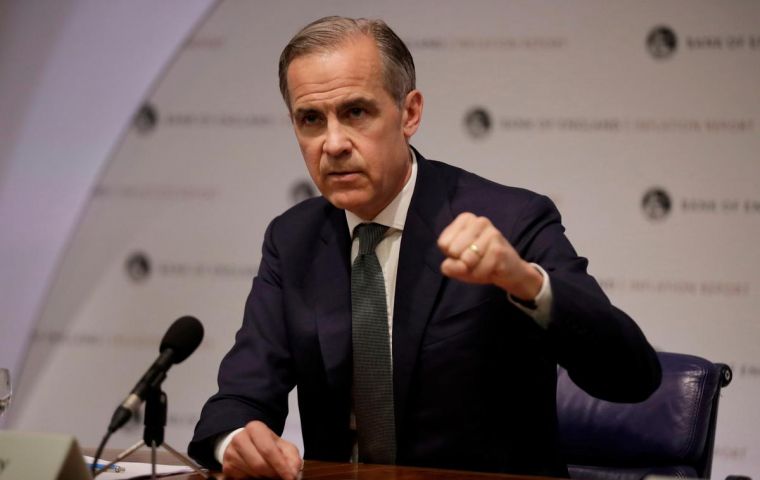MercoPress. South Atlantic News Agency
Bank of England interest rate evolution depend on resolution of the Brexit impasse
 If there is a resolution to the Brexit impasse, and inflation and growth continue to pick-up, then more increases are likely, governor Carney said.
If there is a resolution to the Brexit impasse, and inflation and growth continue to pick-up, then more increases are likely, governor Carney said. United Kingdom interest rate increases could be “more frequent” than expected if the economy performs as the Bank of England is expecting, governor Mark Carney says. The markets are forecasting just one interest rate increase by 2021.
But if there is a resolution to the Brexit impasse, and inflation and growth continue to pick-up, then more increases are likely, Mr Carney said.
As expected, the Bank kept interest rates on hold at 0.75% at its latest policy meeting.
Interest rates have been at that level since last August, when the Bank raised them by a quarter of a percentage point. The Bank is expecting growth and inflation to pick up over the next two years.
In a news conference, Mr Carney said: “If something broadly like this forecast comes to pass... it will require interest rate increases over that period and it will require more, and more frequent interest rate increases, than the market currently expects.”
The Bank's forecasts are based on a “smooth adjustment” to any new trading relationship with the European Union.
In its Quarterly Inflation Report, the Bank of England raised its UK growth forecast for this year, in part because the outlook for the global economy is a bit brighter. The Bank now sees growth of 1.5% this year, up from February's forecast of 1.2%.
Economic growth has been subdued since the UK voted in June 2016 to leave the EU. In particular, business investment has been falling.
The Bank says stockpiling has been giving the economy a short-term boost, but for this year, the strengthening of the global economy will have a more important effect. In the minutes from its latest policy meeting, the Bank said “global growth had shown signs of stabilization, and had been a little better than expected”.
It also forecasts the unemployment rate will continue falling in the coming years to 3.5% by 2022, which would be the lowest rate since 1973.
The Bank is reluctant to move interest rates until there is further clarity, not least about the path of Brexit.
For as it highlights (again), the movement in rates then could be “in either direction”, depending on the outcome, the impact on the economy and whether it decides to support growth or inflation.
If all goes smoothly, then the Bank is likely to turn its firepower on inflation and proceed with raising rates “at a gradual pace and to a limited extent” - especially if there's a bounce in investment and hiring.
At the moment, the MPC reckons “the cost of waiting for further information is relatively low”. But that, given the degree of inflationary pressure it's forecasting, is quite a gamble.




Top Comments
Disclaimer & comment rulesCommenting for this story is now closed.
If you have a Facebook account, become a fan and comment on our Facebook Page!